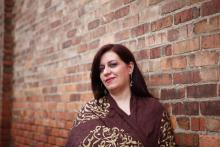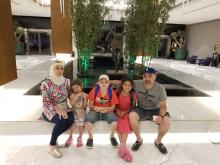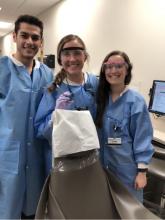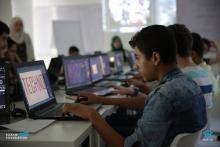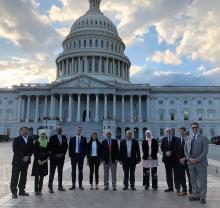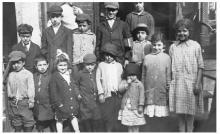Nada Odeh is among the 7,000 Syrian Temporary Protected Status (TPS) holders living in the United States. Nada is a well-known art educator, visual artist and museum curator. She works with folklore societies, refugee communities, and museum associations all over the country, using art to tell stories, connect people, and heal trauma.
I came to Lebanon in the summer of 1990 to hide from my friends and neighbors in my hometown of Aleppo. I believed I did well on my Baccalaureate exams, but I was afraid of disappointing my loved ones if I had not, so, I hid in the beautiful city of Beirut and waited for my test results.
Monzer Shakally is a dental student who came to the US 6 years ago. Last year, Monzer shared his incredible
journey with us, and we caught up with him recently to see how things are going.
Read his previous stories here: https://arcsyria.org/article/monzer-ive-always-wanted-democracy
On the last day of last January, the Trump administration announced an 18-month extension of the temporary permission that granted some Syrians to stay in the United States.
It has been five long years since Ahmad, his sister, and their parents were all together as a family back in Damascus, Syria. Today, as uncertainty swirls about the status of Syrian refugees in the US, Ahmad is not sure when--or where--there will be another family reunion.
This much he does know: He does not plan to go back to his war-torn country any time soon. Now 33 and a cyber security expert working at a US-based company, Ahmad’s dream--the dream of all displaced people--is to find a place to settle and live a decent life.
He goes by Moe, his favorite character from The Simpsons. And it’s thanks to them--along with a hearty diet of American movies, shows, and video games--that Monzer’s English is so good people have a hard time believing he’s from Syria, a country he fled five years ago after being arrested for peacefully protesting the government and its policies.
Washington D.C. -- On October 25th, Syrian-American organizations, and members of the American Relief Coalition for Syria (ARCS), were in the nation’s capital, advocating for robust educational access of Syrian children displaced within Syria and the surrounding region.
On October 25th, ARCS members from across the country came to Washington, D.C. to meet with their representatives and advocate on issues that have the most impact on their work. They spoke the importance and need for new approaches to education for Syrians and on the challenges and barriers that bank derisking imposes on their organizations.
This May, I concluded my full academic year internship with the American Relief Coalition for Syria; serving as the Communications/Advocacy/Marketing Intern during the Fall 2016 semester, and continuing on as the Senior Communications/Advocacy Intern for Spring 2017. As a Senior at the George Washington University, I became interested in getting involved with the coalition after witnessing the collaborative and multi-layered humanitarian programs launched by Syrian American diaspora organizations within the United States.
The first Arabs immigrated to the United States in the 1880s. Most of them came from Greater Syria, which is present-day Lebanon, Palestine, Israel, Jordan, and Syria. Typically, immigrants made the journey to escape economic struggles and to pursue the American dream. In recent years, the migration from Greater Syria to the United States has been driven largely by political unrest and religious conflict in the Middle East.
